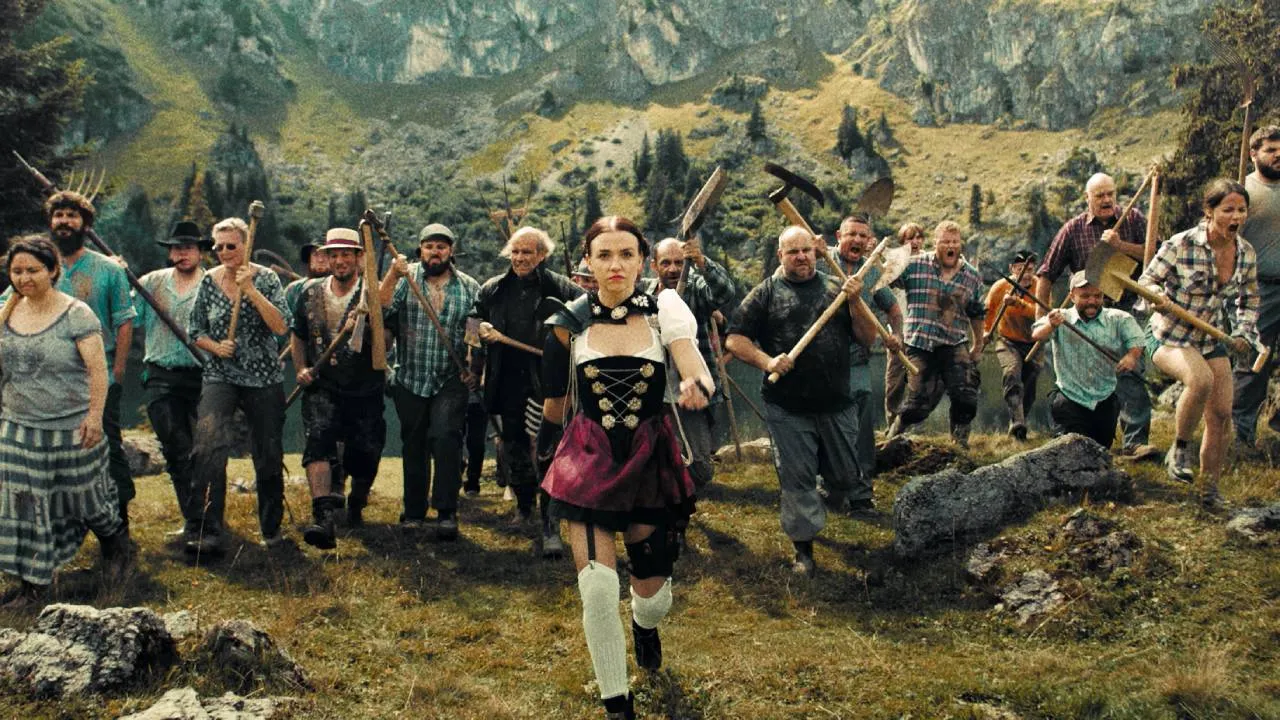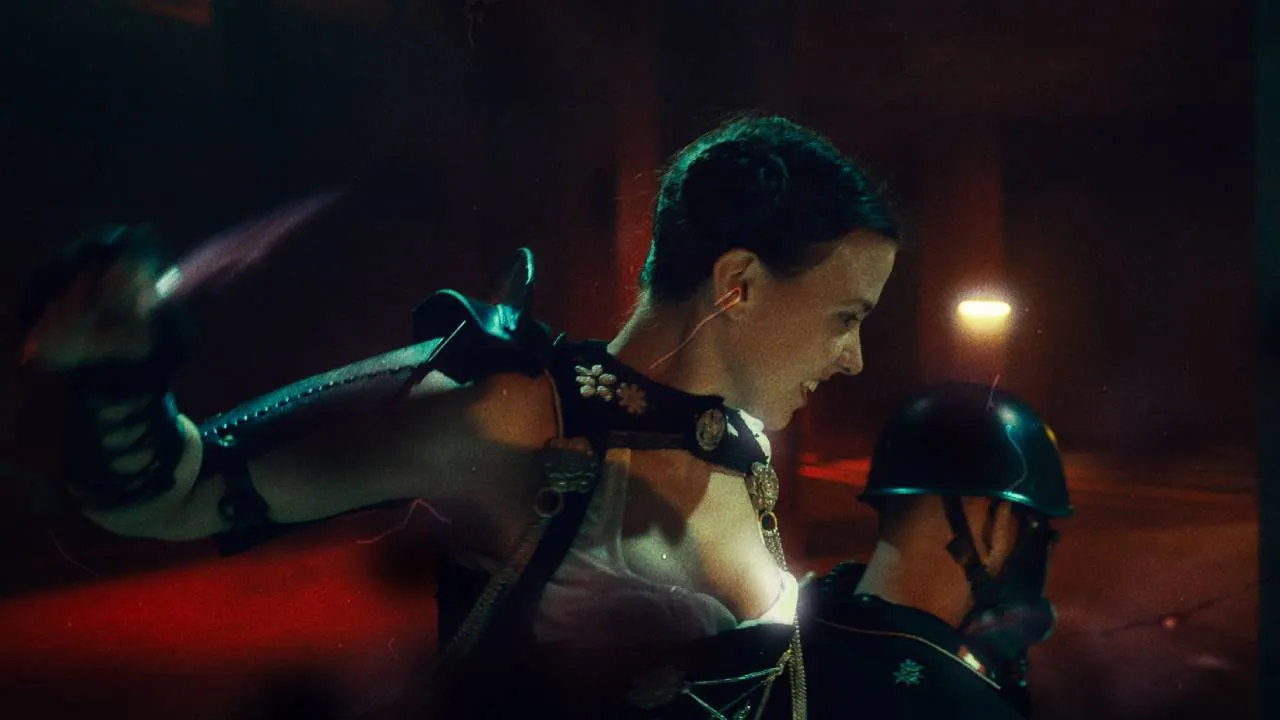In brief
- Film producer Valentin Greutert is using a blockchain-powered crowdfunding platform to let fans invest in his next feature.
- "Swissploitation" film Mad Heidi will be part-funded by micro-investments through the blockchain platform FilmChain.
- Unlike other fan crowdfunding drives, investors will receive a cut of the film’s profits.
Valentin Greutert is the proud producer of what he refers to as “the world’s first Swissploitation film,” Mad Heidi. The gory schlock-horror film tells the story of a Heidi who drank her milk, grew up, and now fights the good fight against the cheese-eating fascists who’ve taken over her homeland. With an axe.
It is very Swiss. At one point, someone’s tortured with a fondue set. There’s a gruesome murder-by-Toblerone.
Chocolate and lederhosen aside, Mad Heidi is much like any other independent feature film, except for one massive difference: Part of the financing for the film will come from fans, through a crowdfunding campaign powered by blockchain platform FilmChain. Unlike conventional crowdfunding drives, though, anyone who contributes will become an investor in the project, and will receive a cut of the profits.
And that, Gruetert told Decrypt, is a gamechanger for unconventional film-makers such as himself. Films like Mad Heidi “are almost impossible to make in the traditional system,” he explained. “[Film commissions] don't want you to be global; they want you to be local. You need to speak a certain language, have certain actors from certain countries. I mean, we're making an English language film.”
Why use blockchain to crowdfund films?
Film-making is an expensive business. The average budget for an independent film—one that’s not backed by a major studio like Warner Bros or Disney—is $750,000 (and that’s a conservative estimate).

To raise that kind of cash, most indie film-makers will turn to subsidies from local film commissions for at least some of their budget. In Europe, that means you end up with “10 to 20 different sources of financing,” said Greutert. “Every source has its own restrictions, which means you have to spend the money in a certain area, you have to hire people with a certain nationality, because all these subsidies have an economic basis.
“They're not made to make the best movie possible,” he added. “They are there to justify these subsidies for the politics.” That, in turn, results in a certain type of film tending to receive funding. “I would call it a local social drama that doesn't really find an audience.”
Exactly the opposite type of film from Mad Heidi, in other words. But its gory exploitation-film premise is just the sort of high concept that grabs the attention of genre fans: perfect for a crowdfunding campaign. Greutert’s co-producer on Mad Heidi also produced the similarly out-there Iron Sky franchise, in which Nazis attack Earth from a Moon base; the second entry in the series raised $500,000 on crowdfunding site Indiegogo.
How does FilmChain work?
To track Mad Heidi’s revenues, Greutert turned to FilmChain, an Ethereum-based platform that uses blockchain to create an immutable record of a film’s finances. “In the film world, there are, like, three global companies that do revenue collection, with old-style technology,” Greutert explained. “A huge office with hundreds of people in there, collecting the data, typing it into an Excel sheet.” FilmChain, he said, does away with those inefficiencies. “It revolutionizes this business in the sense that they tokenize the waterfall—how the revenues are distributed.”
“[FilmChain] revolutionizes this business in the sense that they tokenize the waterfall—how the revenues are distributed.”
However, the fan-driven crowdfunding approach pioneered by Mad Heidi was boundary-pushing even for FilmChain. The platform was created to track the money flow of productions—but it hadn’t been designed to take account of early-stage crowdfunding revenues.
“I went to FilmChain and said, ‘Okay, your system is nice, but it starts too late—I want investors to be able to pay, and this will automatically start creating the waterfall on your platform’,” he said. “We built a system where people can invest at madheidi.com and they automatically get an account on FilmChain, the investment is recorded there.” Once the investment call is closed, all the investments are minted on the token, generating a smart contract. “Then later on, all the revenues go directly to FilmChain and directly down into the wallets of the investors.”
Those investors don't necessarily need to be cigar-chomping Hollywood moguls; investments in the film start at CHF 500 (about $550). “Essentially, we're giving out 5,200 shares,” said Greutert. “4,000 are for the public, 1,200 we keep for us.” Just like conventional crowdfunding drives, higher-tier investors get extra perks, like premiere tickets, invites to the set and a share in the merchandising revenue as well as the film revenue.
Huge congrats to our friends @madheidimovie! Amazing to see the incredible fans response to their innovative crowd-equity investment model! We had the best time as technical provider and CAM. We are cheering you on and can't wait to see the film! 🎥🎉 https://t.co/uhsc61FYkl
— FilmChain (@Film_Chain) September 30, 2020
The advantage of using FilmChain, Greutert said, is that for the first time, it’s possible for film productions to handle crowdfunded investments on a large scale. “Before, how would you even handle 200 investors?” he said. “It's almost impossible if you do it on paper; you're doomed to make mistakes.”
Lights, camera, action
Although the crowd-participation stops short of fully decentralized governance of the Mad Heidi brand (as seen with projects such as MetaFactory), Greutert stresses that, "We're trying to build a community that we can also ask for things—ask for feedback, and so on. It's a whole different kind of filmmaking."
The fans-first approach to film funding brings its own challenges, of course. Because the film’s entire production is built on word-of-mouth hype, the usual indie film distribution model won’t work. “We need a global same-day release, or we're going to be dead,” said Greutert. A staggered release for a crowd-pleasing schlockbuster means that “piracy will hit you dead,” he explains. “We started building a community around this film before we even started writing a script. Normally, then you start marketing. While we’ve created our market from scratch; it all runs in parallel.”

Fortunately, streaming video means the technology is there to launch the film globally, but there are still difficulties to overcome. “The way films are distributed in this world, the producer has a deal with a sales agent. And the sales agent sells the rights to this film to different territories. So in Germany, France, the UK, you have a different distributor—and they release the film when they want. Only big Hollywood studios are capable of releasing a film on the same day globally.”
“It’s a kind of pirate approach, because it cuts out all the middlemen—and these middlemen, they just suck up all the money.”
Greutert’s plan is to circumvent the process by leveraging the global fan base that Mad Heidi's built up. “We release the film worldwide on the same day—we can at first do this only over our platform, because it has enough clout that this will actually work out.” It’s a new approach, and one that hasn’t been tried to date. “It gives the independent filmmaker back some of the power that only Hollywood Studios had so far,” Greutert said. “It’s a kind of pirate approach, because it cuts out all the middlemen—and these middlemen, they just suck up all the money.” That spirit of independence is one that’s shared by the blockchain community, he adds.
We’ve made over 35% - to be precise: 360’500! 🤩
We can’t wait to start shooting the movie.🚀 All we need to start the production is to reach 1M until the end of the year! Otherwise, all investments will be refunded. Hurry up and become a Mad Investor➡️ https://t.co/GPU0vma9nG pic.twitter.com/GYtBpBNwqk
— MAD HEIDI (@madheidimovie) October 12, 2020
There are other challenges, too: US investors are barred from participating, for one thing. And it’s early days for the project—Mad Heidi has raised CHF 360,500 of its hoped-for CHF 1,000,000, with 80 days left on the clock. If it doesn’t meet its funding goal, the money will be returned to investors. But Greutert is looking further ahead. “We need to make the model case,” he said. “I hope that other filmmakers pick up the idea and find new twists and ideas for how to work with it.”
In the future, he added, producers could finance a slate of productions through blockchain-powered micro-investments. “You could say, ‘Okay, let's make five different kinds of movies’, so we can balance the risk a little bit from film to film.” Perhaps even expensive productions could top up their funding using FilmChain or similar platforms, proving audience demand as they do so.
“It's time for us to go directly from the filmmakers to the audience,” Greutert said. “We need to jump over all these people who just take away the money. And with the Internet, we can.”

